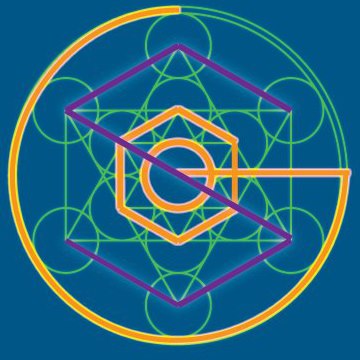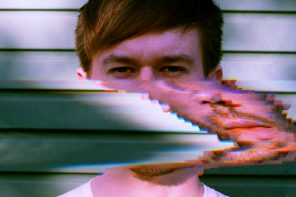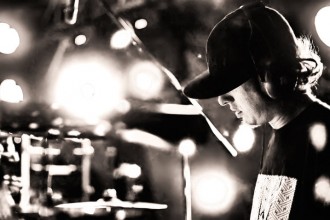I had the great pleasure of doing an interview with Andy Beyer, who produces under the name Sonic Geometry. For this interview I went down to Andy’s house where we got in the hot tub and broke reality open. We went on a journey from the beginnings of his artistic musings into the depths of the mystery of 432HZ and everything between. The conversation connected back to ancient past and cast a stone into the tide pools of the future with the hope that it will ripple back and effect change here and now. Be sure to check out Lets Restart the World, Sonic Geometry’s new EP on Uxmal Records, coming out on Valentine ’s Day 2014.

Digital voice recorder, check. Pen and notebook, check. Swim suit, check. Pipe and cannabis, check. I had my leather over the shoulder briefcase packed for my first professional interview. I was excited to finally be using a digital voice recorder that I had purchased years ago on the recommendation of a playwright friend. As I was getting it ready I discovered some old conversations about the aesthetics of art. Life has come a long way since then. I now find myself forging on as a poet and community organizer in the republic of Colorado, wrangling dreams from upon high to the lowly planes of existence.
My wife arrives home a little late from yoga. We greet each other cordially and she informs me that she thinks there is enough gas to get there and back. I hurriedly gather up my briefcase and head into the wintery night. I start the car and check the gas gauge, just over E. Just another day upon the journey of a poet. Heavens laced boots held up by the faith of insanity. As I drive to the interview I feel like I am finally starting to feel at home as the roads I travel are familiar and I easily navigate through the snow.
I get to Andy’s, go up to the door and knock. There is a voice from inside and I am informed that the entrance is around the side. I receive a warm welcome from Andy’s wife Michele whom I have met at various events around the area. Andy comes out from a back room and offers me a cup of tea. Having a love of tea I gladly accept. We drink our tea and catch up on what’s happening in our personal reality tunnels. When the tea is finished I go into the bathroom and put on my swim suit. I take my clothes and put them in a neat pile near my briefcase. As I wait for Andy to get changed I gather my tools for the interview. I realize I forgot my Palo Santo that I was going to use to smudge and create a container for the interview. As I am realizing this Andy comes out carrying a lighter and Palo Santo. All happens as it is supposed to. We go into the brisk winter air and scurry our way to the hot tub. Andy removes the lid and we climb in. The warmth envelops me and takes me into a pleasant place of relaxation. Once we are settled we light the Palo Santo. We each say a blessing and enter a state of gratitude as we smudge ourselves and the space with sacred smoke.
[LiS] We are live. We are not the living dead we are the living living. We have entered the space we now move in. So where did your journey as an artist begin?
[SG] Well you know I almost feel like the way I want to tell the story is like Fight Club. In Fight Club the story starts from a certain point but then he’s like “let me back up.”
Yeah, yeah and I may just stop you to ask some questions. We will just go. Lead where you want to because this is your interview.
It was 2008 and my parents gave me a Christmas present. They hadn’t gotten me a present in a while and they wanted to get me something nice. So they bought me a sampler. I played around on the sampler a lot. I was smoking lots of weed and skipping lots of class at the time because of it.
What grade where in then?
I was a sophomore at CU, and your recorder thing just fell in the hot tub.
It was just the case.
That would have been bad. So someone had told me about Abelton. I began messing around with it and recording this sampler in it. I had been working on what I thought was this pretty cool track that used layered sounds from the sampler and recording them into Ableton. I had some nice grooves but I thought what is missing here? I have been a guitarist since I was 9 years old. It was always my instrument and I thought why don’t I add some guitar. So it was kind this funky house type four to the floor track and I started putting some guitar in there. It was like my whole world blew open. About a year before I had gone to a rave and taken ecstasy for the first time. That experience and seeing people dance to a DJ was the most incredible thing. I wanted to go do this as much as possible.
So this was your first electronic music experience as well?
I had gone to this rave and then also later that year I saw Sound Tribe and then I got this sampler. It all snowballed into me wanting to make electronic music. Especially when I started adding guitar and I noticed the power of combining live instrumentation with electronic music. The whole culture and the audience response and the way it brings all these people dancing together to the same beat. You know everyone is so in synch. I wanted to take what I knew from playing traditional instruments and bring it into this new music. Which is kind of an echo of the ecstatic dance culture which has existed for thousands of years on this planet. Then an old memory came up when I was 15 years old and I was in my friend’s room playing with a midi controller plugged into Garage Band. I made my first electronic track that I had ever thought of. I was thinking “ok what should I call the artist for this” as I put it into iTunes. I had remembered seeing somewhere “Sonic Geometry.” I’m like, that is a cool name that sounds like an electronica thing. So I just put that in there. That was in 2006 now I’m in 2008 and I think voilà, this is Sonic Geometry. Going back again when I was 8 years old, I heard this song by Steppenwolf called “Magic Carpet Ride.” With this psychedelic organ break. It was the first time I had heard anything like it. It is what made me aware of the sound of psychedelic music. So that memory was buried in me and had been influencing me. Then this idea of seeing Sonic Geometry coming into my head when I was 15-16 and I thought to myself if I am ever an electronic music artist I am going call myself Sonic Geometry. Then there I was sitting in my room smoking a joint listening to the stuff I had just recorded. It was like bam this is Sonic Geometry. This is the music that I want to make.
So this was 2008 when you fully stepped into the role of creator and artist as Sonic Geometry?
Yes.
Who are some of your influences as an artist?
Jimi Hendrix is huge. I had just purchased a guitar and a music teacher recommended him and I just ate it up. I was 10 years old and all I wanted to play was Hendrix. My teacher thought it might be too hard but I was like no I am going to learn this music. It had lit a fire in my soul. That’s what it felt like. All I wanted to talk about was Hendrix. It was Hendrix, Hendrix, Hendrix. I would play his music as loud as I could. When my parents asked me to do chores I would put Hendrix in my headphones on a discman. I had listened to a couple of songs by him. Then I was in this record shop looking for a Beastie Boys album. They didn’t have the one I wanted but they had Electric Ladyland. I listened to the song “Voodoo Child” and “All Along the Watch Tower.” This shit was transcendent. It blew my mind. You know in the same vain Pink Floyd has been hugely hugely influential. Especially David Gilmore. Many times people will come up to me and say “you must really like David Gilmore” and I’m like “you know what? Yeah I do.” Sometimes I am almost like a David Gilmore clone in terms of my lead guitar playing. Then the whole Pink Floyd’s approach to production and song writing. Their whole albums are just one piece of music.
It’s almost like a Greek tragedy with its complete manifestation of the emotional value system.
That’s what’s so great about it. There’s development of a storyline. A lot of pop music today, I mean a lot of music.
Is written for singles…
Yeah. Written for singles. There is something great about that. We have a culture of short attention spans. So being able to have an experience in a small amount of time is wonderful. Pink Floyd even had this, like the song “Money” for example.
For sure. You have to make singles in order to be a pop band.
And that’s what grabs your attention. Like the song “Time.” It grabbed my attention and from that song I began to explore the rest of the Dark Side of The Moon album. Then rest of the Pink Floyd that’s happened. When you are able to sit down, give it time and let it unfold, it blows wide open. That I think is my favorite kind of music. Something that I listen to and it unfolds. Pieces of story keep coming out.

Yeah, the more you listen to it the more you see in the undertones.
I also really like funk music. The whole beat of funk, the pocket, just that groove. A great funk tune can be the same exact two chords for five minutes. The variations are slight but they are so on it. Just riding that one idea. Great funk I think is the greatest dance music.
I agree, Parliament is one of my favorites, man.
The same music teacher that turned me on to Hendrix turned me on to a band called Tower of Power. They are the tightest funk band. They have the cheesiest kind of funk soul lyrics. Now a days they play lots of hotel shows, probably casinos. Tower of Power introduced me to funk. The thing about Tower of Power is that they are so tight. You listen to a live show it sounds like the most brilliant studio recording you have ever heard. They are just on it in the pocket. I feel like that’s what funk is, every 16th note is there.
For sure. And so much hip-hop has been informed by that.
Not to mention hip-hop has been super informed by jazz. Jazz is actually what got me into hip-hop. I was taking jazz classes and I was a diehard that thought that music was only made with real instruments. I didn’t consider hip-hop and electronic music real music. That was a long time ago, like 10-11 years old. But then studying the jazz and getting on to the jazz and seeing how it evolved into hip-hop and futuristic dance music. I feel that John Coltrane in his day was just as hip as Shpongle is today. That was the cutting edge of music.
Absolutely. We totally wouldn’t be where we are without that homage. To specifically call out the contribution of black people to modern music is enormous. So much of what became popular was white people ripping off what black people were doing.
Also a lot of it was fusion.
Right and where we are at today is a fusion of all cultures.
The world has become a small place because we are so interconnected. 100 years ago it was way different.
Totally, a 100 years ago you go to Boulder and it’s all horse drawn carriages.
There was this fusion of black people with slave songs and hicks from Appalachia making moonshine. They came together to create rock and roll. Now you have West African musicians who grew up playing their traditional instruments. Then because of the cultural melting pot they learn western instruments. That’s the kind of thing that pushes music forward. When you take two seemingly separate musical traditions, put them together and synthesize something new out of it.
I think you can take that and implement it in all forms of art. If you look at all great art movements it’s always when things are coming together and they morph. All of a sudden that old form is no longer applicable and a whole new form evolves.
I have heard before some people say there’s only 12 notes. So all the music that can possibly be made has been made and we are just basically going to be copying the same thing over and over again just with slight differences. I don’t think that’s true. I mean yeah there are only 12 notes in our scale but there are an infinite number of frequency values between two exactly adjacent notes. There is infinite space between there.
Exactly. I think the same can be applied to thoughts. The idea that everything has been thought before or that it’s all been done before. But I mean in a multidimensional way it has all been, but it’s about you bringing yourself and making yourself present within it. It’s like an actor going through the play and doing the same play for over a hundred nights. How do you recite the same lines, go through the same experience and bring freshness to it. It’s the same thing with all artists. You’re playing your same song, you’re reading your same poem. It’s about bringing presence to it which gives it that life.
You know Socrates believed that the entire potential for knowledge was contained in every human being. It’s not that everything has been thought of but everything is there to think of. It all exists within everything.
Yes, Blake talked about all of creation being contained in every drop of blood.
Exactly. I mean look at it from a scientific point of view. Every single different atom, the whole universe as we know it is all made of the same basic stuff.
Have you read any of Leary’s books or listened to any of his interviews?
No.
He talks a lot about the DNA knowledge and psychedelics being able to tap into the knowledge that is stored there. There is also the possibility to pass on damaged DNA from a degenerative disease such as syphilis. So there are all of these disconnections passed on in our DNA. I think that in order to move into the future this is where the work is and I think art really does this. It breaks into the body and releases the old energetic patterns so that new energetic patterns can emerge.
I don’t necessarily know that it’s in the DNA. But I agree that we can kind of go change the patterns. Alter our course though the Universe. Because of the infinite potential of humanity inside each one of us, we have the ability to decide to make this old paradigm of selfishness or egotism secondary to a new paradigm of selflessness and community. You know coming back to what we are talking about. That’s what is.
That was my next question. How do we bring this all back home to you and your art specifically? Now that we have broken open this huge container how does this inform you as an artist?
Oh, wow. We’ve zoomed way out. Where do I focus back in?
Maybe I can help. Basically what we’re talking about is making the choice. All information is contained within you. So then it’s up to you to make the choice. The responsibility comes back down on to you. So what has been your journey to take on the role of artist and committing yourself to your music? Like you were in 2008 “I know what I want to do.” How has your journey come to this point to be the next step? Also you can incorporate what we were talking about because it’s a larger philosophical experience that is the artist. An artist is not just a pop star. The reason an artist is an artist is because they are an informed conscientious Human being. At least this is my highfalutin statements of this.
I really like where you are going with this. Back to the name Sonic Geometry, when I first decided to use it as my name it was just something that sounded cool. All kinds of people asked me “what is sonic geometry? What do you mean by this?” It pushed me on a journey to figure out exactly what is this sonic geometry, sacred geometry stuff. This might take a second to come full circle.

It’s ok we’ve got time.
The original inspiration to play electronic music came from being high on a lot of drugs. Psychedelics and ecstasy. It’s funny what inspired me to take drugs in the first place was music. So in that way it kind of came full circle.
Could we call it medicine from here on out instead of drugs? Is that cool?
That’s fine. I was definitely inspired by certain medicine. That kind of gave way and I knew that there was something very deep. I was looking up today the etymology of the word psychedelic. It means something like mind clearing.
Mind manifesting.
Yeah, to clarify or to manifest is the Greek word Delos then psych which is mind. So its mind manifesting and you know sonic geometry for me has been its own psychedelic experience. It has been manifestations in the mind and of the mind. So people start saying “what is sonic geometry?” I am looking up sacred geometry. Sacred Geometry is basically the idea of proportions and ratios that exist in nature and it comes into play with architecture and art. Using these patterns that nature has given us to improve our lives or deeper understand our Universe or consciousness. A lot of people started asking me “have you experimented in music in 432HZ?” I heard a lot about this. There is actually a movie totally unrelated to me except same kind of topics and is called “Sonic Geometry” that talks about this frequency. Western music pretty much uses an ubiquitous 440HZ to tune our instruments and 432HZ is slightly lower. There are a lot of people who believe that tuning our music down to 432HZ somehow makes the ratios vibrate more with our consciousness. I think its 99% a load of bologna. Some people might take that as blasphemous but what it comes down to is that we are tuned to a tuning system that was basically standardized and established about 400 years ago. Even if we tune down a little bit we aren’t changing the ratios in our music. So to look at tuning systems that have different ratios we have to go back to Pythagoras. Pythagoras created the basis for our modern scale by using harmonic ratios. He based the scale degrees off actual harmonics that existed in nature. Then around 1600, people started using a tuning system where all the notes were adjusted just a bit to make things sound more in tune. But the flip side to that is the ratios got totally thrown off. It just so happens that one of those frequencies in the Pythagorean tuning system is 432HZ. Why the pseudoscience community has locked on to this and they believe this frequency is magical I don’t know. I personally think it’s a bunch of pseudoscience mumbo-jumbo but to bring it back, what has begun to unfold is that there is a whole mystery of which the 432HZ Pythagorean tuning is just the tip of the iceberg. A doorway leading into something where music can be the psychedelic experience. Music can be a direct reflection of our presence and it can bring us into absolute presence. It can help or perhaps on its own manifest a level of presence we probably haven’t known for thousands of years. That we have forgotten as a race.
This is really interesting. I’m not going to name the band or anything because I’m not sure about copyright issues but this guy I know has a son that is a personal assistant for a big band in Iowa. This heavy metal band is making frequencies that have a physiological effect such as an upset stomach. At shows when the audience isn’t pumped up enough they play these frequencies and it will get the audience all riled up. So what you are talking about is actually physically happening. I think I heard that they were trying to copyright these frequencies.
Can you copyright a frequency?
These days you can copyright almost anything. But it doesn’t even really matter. What matters is that sound frequencies that create physiological effects are real and happening. We’re going to be getting deeper into all of this and studying it. Especially as we become more of an artist society and we create space for us to study. That’s really what I think all of this is. We are trying to get to a point where we as artists can really start to deepen and discover what the hell we are doing. We just have to get to a stable point where we aren’t trying to just survive.
That’s the huge challenge. It’s the tipping point.
This has been the challenge the entire time of art history. So we’re really in good company.
You know what’s interesting is that the music inspired journeys with medicine and journeys with medicine inspired the music. But now it’s coming to a point where these journeys in music have become the medicine. For me they have pretty much replaced the medicine. I think anyone can get to this point. Medicine can take us so far but what we are able to access through meditation and flow practice take it to the next level. For me the deepest and most paramount thing is music. I’m beginning to discover all those intangible things that would be uncovered in a medicine journey that I felt so close to are now beginning to come into focus. In a way that is more real and more tangible then I ever even realized was possible.
Exactly, that’s really what the grand lesson of the 60’s psychedelic movement was. I really feel what the medicine did was that it opened people up to self-expression. It gave them permission to create. The social structures where so ingrained that the medicine was needed to break open. The big thing of the 60’s was the self-expression that was permitted. Then you have to, as you were saying, step into it in a state of sobriety. That state of sobriety is what allows you to master it. If you are on medicine all the time you can’t get into a state of actually mastering the craft.
Yes, to be able to master anything you need complete ownership of it. Having to take something external to give you access that’s not mastering. Kesey said it himself, at the Human Be-In in 1967, that it was time to graduate from medicine. Tom Wolfe writes about it at the beginning of “Electric Kool-Aide Acid Test.” He had been on the run and turned himself in. Some people say he said this for his own positive self-image but I don’t know. Take it as you will. The time had come to graduate from taking medicine to achieve these states and to the true ownership of them.
Acknowledging that the medicine opened you to the knowledge that these states are here. But then it’s your responsibility to start going into this space and like you say, owning it. Starting to find access to it in a focused point because with medicine you just get so blown open. There’s a million different things coming through so you’re totally inspired but the focus is just gone. It’s like ADD x 10 million. You are just aware of all that’s pouring into your senses. It’s like a microscope. You’re looking into the water and all of a sudden you are seeing all of the little details floating in it. Then you look up and you see all the details floating in the air.
That’s a great metaphor. It’s like your eyes are a microscope and everywhere you look you can see this incredible detail. But looking from one thing to the next how do you piece it all together unless you zoom out.
Come back and breathe. I feel like what happened with the 60’s was the media brought all these kids that dropped out and couldn’t support themselves into the culture and the culture wasn’t prepared to deal with it. Kesey was only able to do what he was doing because he made all that money off his book “One Flew Over the Cuckoo’s Nest.” Then all of a sudden because of the media hype there are a bunch of teenagers coming to San Francisco by bus because they have seen all the hippies on the news with the bus tours going through Haight Ashbury viewing all the strange folk. Then speed and heroin enter the scene. Finally there is Altamont in 1969 and it all goes underground. Now the underground is breaking soil.
There are still a lot of people in that culture today who put a bit too much focus on the medicine. At the same time there are a lot of people understanding yoga and meditation for what it really is. People are really starting to get manifestation and flow and it’s really becoming a part of their world.
I totally agree. There is a whole new way of thought. What we could call a philosophy. It’s a philosophy that is connected to all of these older traditions and older patterns. If you really study art there has always been an inherent connection to lineage. A lot of the artists of the 60’s were very well read and connected to what came before. There has always been a lineage and tradition. Now it’s about connecting all of this and figuring out how to bring it forward in a fresh way. I think society is more ready for it then they have ever been before. The reason people are starting to get yoga and all that stuff is because they have been exposed to it their whole life. Our generation has been exposed to things on a global scale that as far as I know have never happened before.
It’s a beautiful thing.
Yes it is. It’s like being able to sit in this hot tub and have this conversation. It’s glorious. I thank you so much for the opportunity to come and do this.
I thank you so much for the opportunity to able to share this stuff.
 I think this might a good time to start moving in the direction of wrapping up. What is on the horizon for Sonic Geometry?
I think this might a good time to start moving in the direction of wrapping up. What is on the horizon for Sonic Geometry?
I have an EP coming out called Let’s Restart the World. It came about in the first days of January 2013. In the preceding months I had drifted further and further away from making music. I was very unfocused, taking way too much medicine way too frequently. It was just after New Year’s I had stayed up all night on an atomic cocktail of medicine. My intention was to hang out with my friends and while we were on the journey I was going to play some music for them but I was too blown out of the water. They were going to sleep and as the night was winding down and I smoked a little bit of some very powerful medicine. For the fourth time that night it felt like time started all over again. It felt like the Universe was getting a fresh start. My friends were in bed and I thought “I am going to make this night worth something more than just a fleeting experience. I am going to put my head phones in and mess with my live set.” Which I hadn’t done for a few weeks prior. I started playing and in that set was a sample from Jimi Hendrix saying “We would like you to forget about everything that went on today or last night or things that are supposed to happen tomorrow because we are trying to make our own little world right here.” Inspired by that I started a track called Let’s Restart the World about fresh starts. Start the universe over at this very moment. A new beginning. Then over the course of 2013 I went from crashing on couches and being totally unfocused to having this EP come out on Valentine’s day. I’ve gotten married and I live in a house now with this sweet hot tub.
Yes, it’s a very sweet hot tub. For all you people reading out there in non-presence, here place put your mind in the hot tub.
It’s a good place to be. Coming back to last year I had a track released on a compilation from Gravitas Recordings. I have really liked what they are doing for a long time. It’s been a great honor getting on with them.
So Gravitas will be putting out the EP?
The EP will be coming out on a label from Mexico City called Uxmal Records. I got hooked up with them because I do a lot of funky upbeat party music. I love making high energy dancey stuff but I also like making some chill stuff. I have a bunch of heavier dance party stuff which is the stuff that’s in the Gravitas vein, I am hoping to be working with them on an EP release. I was thinking what do I do with this chill music. I looked for some good up and coming chill out labels that had a good reputation and were getting music into peoples ears. Uxmal Records was one that showed up in a few places and they are the ones that got back to me. Before they were a record label they threw psytrance parties. Something that I hadn’t considered before that now seems like a fun idea is playing down in Mexico City.
There are lots of interesting things happening down in Mexico. It’s a good place. I really hope the legalization of medicines helps elevate some of the suffering that’s happening there.
I think that can help elevate most of the suffering that comes from prohibitions of medicines.
Absolutely, addiction and all of that. Legalization really can start to move things forward. Moving from a system where the addicted individual who is acting irrational is treated as a criminal and throwing them into solitary confinement where they freak out more than a system that treats them as patients.
Look at it from a yogic stand point. In order to deal with a problem you need to be able to accept it as part of yourself and be able to flow with it. Not just say this is bad, this is wrong and try to push it away. I think that is what our current legal system in regards to medicine does but there are alternatives. The Netherlands had a huge heroin problem and they legalized it. They accepted it as a part of their society. Instead of trying to shun it they accepted it so they could flow and grow with it. Now it’s not nearly as big of a problem.
A large part of the problem is access. When you are doing these things and don’t have access to them is when a lot of the behavior starts. It’s not about accepting this person’s behavior that is destructive to themselves and the people around them.
Right. It’s not about saying you’re really addicted to some bad stuff but its okay you can keep doing it.
It’s about the behaviors that go along with the substance not the substance itself and that’s on a personal level. It really comes down to personal responsibility and instead of a culture of blaming it on the substance start holding the people accountable. Then as they start to be held accountable they will begin to take on their power. Which is really what it’s about, empowering people and in a way is restarting the World because everyone is their own personal World. Do you have any final thoughts?
Feel the love.
This has been Dank P.h.a.r.t. the Pirate Poet with Andy Beyer a.k.a. Sonic Geometry, many blessings.
After the interview was finished Andy and I sat under a beautiful full moon and smoked bowls of legal cannabis.





